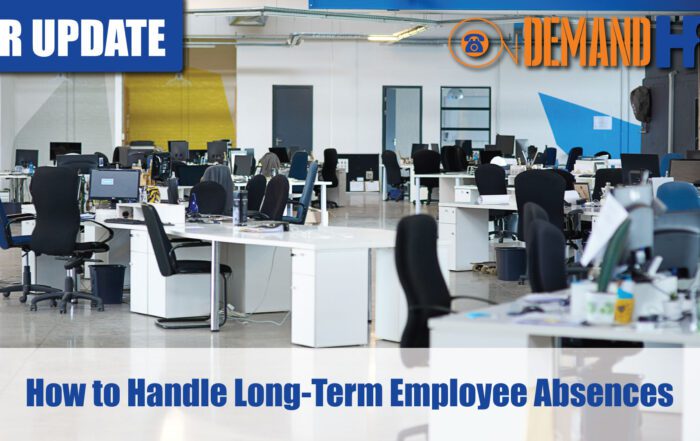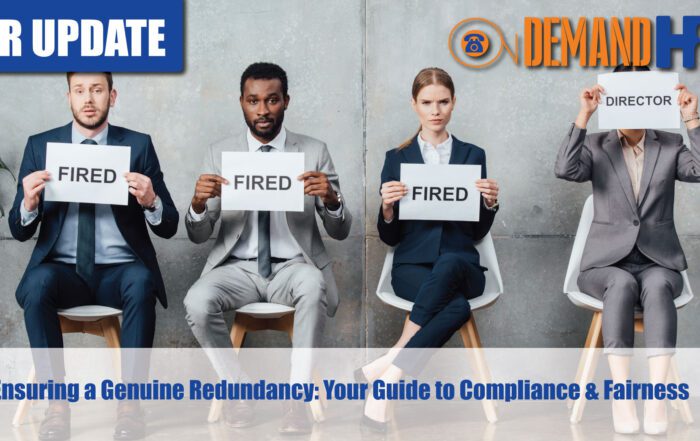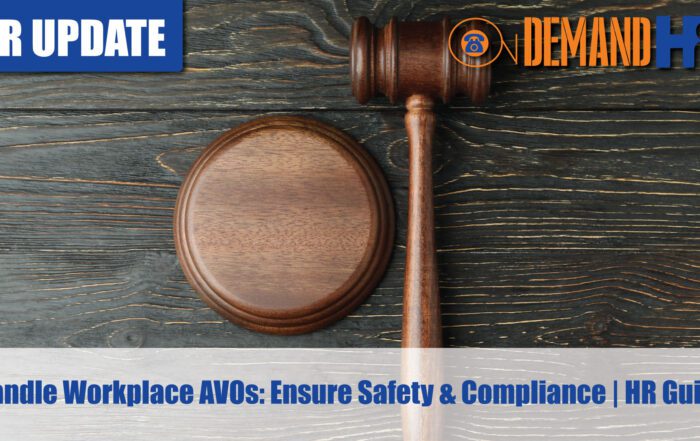Annualised Salary Arrangements
We discuss annualised salary arrangements, how they might impact your business and some of your compliance obligations.
Please see below for a full transcript of the video
Share the HR or workplace relations challenge facing your business and one of our experienced consultants will be in touch within 24 hours with a strategic action plan or discover the best strategy yourself by accessing out free online training library.
Transcript
0:11
Good morning everyone. Welcome to another HR Fridays for Friday 29th January 2021. My name is Clint Indrele, Managing Director of On Demand HR. Every Friday at 10am. We present a different HR or industrial relations topic to you. For those who watch the program regularly, please let us know of any future topics of interest. If you’re watching live or after this video, please ask us any questions in the comments box, and we’ll be happy to answer them on the fly.
The whole purpose of HR Fridays is to provide businesses, other organizations and professional advisors and our associate members with a true lay of the land of all things HR and Workplace Relations. We’re trying to stop the noise and some of the scare tactics you might hear from other advisors who are out there just trying to sell a service. So we’ve been in the Fair Work Commission many times we’ve done many workplace investigations, we’ve dealt with the Fair Work Ombudsman many times, this allows us to provide real perspective and not just theory. www.ondemandhr.com.au.
Today’s topic is going to be Annualized Salary Arrangements. So we thought we’d do this one, because we’re coming up to the first year anniversary of these changes being put into some of the modern awards approximately about 20 odd of the 120 modern awards, but some of the regular awards that do apply to people. So we’ll cover those things today, and talk about the sort of things that businesses should already have in place, if they haven’t should certainly be looking to try to address in the coming months. So let’s get stuck into it.
So first of all, I want to cover what awards have annualized wage or salary arrangements. So coming into effect from the first full pay period from the first of March last year. These were the awards that had such arrangements. So you can see there, the banking, finance and insurance award. I won’t go through the whole list, but I’m just gonna pull out some of the real common ones that we come across all the time. So the banking, finance and insurance award, the clerk’s award, in particular, we we are we deal with that in quite a bit, pharmacy award, we deal with that one quite a lot. And then the manufacturing award, which is a really regular one that we come across with certain clients. And you can see the rest of the list there. Up top. And there are also four other awards that have some sort of annualized wage arrangements, that are likely to mirror the other types in the future. And those are the health services award, the hospitality award and restaurant award in particular, that we deal with very frequently with various different clients. So again, there’s some really common awards there that come up a lot. And whilst it might only be 20 Awards out of the 200, the coverage of a lot of these awards is pretty broad of the ones that are in the in the bucket, if you like of awards that have these these types of rules.
So let’s get into a bit more detail about what this all means then. So if your award has Annualized Salary arrangements, what are you required to do? So, basically, annualised wage arrangements affect full time employees who are paid an annual wage or salary under one of the awards. And depending on the award, annual wage arrangements can include entitlements such as minimum wages, allowances, overtime penalty rates, and leave loading. So you can have a salary or wage arrangement which incorporates all of those things. But employers need to make sure that their annual wage is high enough to cover the award entitlements can’t be anything less than what they would have been paid over the year if they were paid the award entitlements. And the award can also have rules about what entitlements can be included in the annual wage, whether there needs to be agreement on this. And it’s important because there’s differences in all of these awards, it’s important to understand what specific annual wage requirements apply to the awards that affect your particular business. So, again, there’s a requirement to detail what’s included in these annual wage arrangements. And there’s also a requirement in a number of these, these annual wage arrangements, provisions of the award to detail how much overtime how much penalty rates are included in the salary. So that’s probably the most difficult part of it is actually specifying how much overtime and how much penalty rates is included. Because often people will just have a kind of an overarching Well, this salary includes everything within reason where that from an annualized wage perspective isn’t kind of good enough anymore, you need to go into a further level of detail about how much exactly is included. So anyway, that is it. Essentially what an annual wedge arrangement is.
We then go to talking about what are the business’s obligations. So we’ve sort of covered this in the previous slide, but I’ll go through this in more detail. Now, the arrangements must be in writing, they must include what the annual wage is, what award entitlements are included, how the wage has been calculated, and the outer limit of penalty hours, or overtime within a pay period or roster cycle without extra payments. So very important to meet those requirements. And also very important to be recording, employees start time, finish time and unpaid breaks taken. A lot of clients that have or a lot of businesses I hear of that have salaries in place will think, okay, I have salaries in place. I don’t need to keep timesheets, so that that couldn’t be further from the truth. So in any situation, where there’s a dispute, your best mechanism of defense, is to be making sure you’ve got good start finish times and employment records around these particular things.
So it is also important to have the employee acknowledge the number of hours they worked at the end of each pay period or roster cycle, whether that’s by them, providing a timesheet, then importing the timesheet into some sort of system. But it’s important to have employee recognition of those times that they worked.
With, annual wage arrangements, there is the ability for either party to end the agreement with notice that’s that’s a that can be a very complex situation, particularly when you’ve got an employment contract and a separate annualized wage arrangement. So that’s one possible position on that situation is to default back to the award conditions, which would then have a kind of an hourly rate and overtime structure, rather than a salary structure. But I won’t get too much into that, because it’s not very common. But if anyone does come across that situation where an employee wants to come off a salary, and there’s an annual wage arrangement, obligation, best to get in touch with us about, you know, the various situations that can occur there.
The other obligation is for the employer to undertake a reconciliation of employees annual wages against award entitlements every 12 months after the arrangement starts, when the arrangement ends, or when the employment ends. So, again, there’s an obligation there to do reconciliations of did the salary cover the number of hours that were actually worked? So how that’s going to work in practice is very hard to say. We don’t know to what extent that’s going to be enforced. We’ll certainly know more in the coming months from the Fair Work Ombudsman about how they plan to deal with these particular situations. So yeah, a little bit there on the reconciliation requirements.
So why is this significant? Why are we talking about this today? So the first 12 months reconciliation for a number of those awards we spoke about is the first of March 2021. The priorities for FWO, Fair Work Ombudsman in 2021. Talk about underpayment of staff in the corporate sector that being a significant issue of public concern will continue to be a priority for them in those years. So, again, so that kind of gives you an insight into where the Fair Work Ombudsman might look at for these types of things. This is obviously following a bit of a crackdown on wage theft to include ignorant non compliance as well as the introduction of criminal penalties for systematic underpayments. There is also talk about that in the current reforms that have been put forward by the government. There is talk about criminalizing some levels of underpayments and wage theft at the kind of extreme end.
There was a case in 2019 for MADE establishments under the restaurant award where they were penalised 7.8 million as annualised salaries would not above award requirements. There’s obviously going to be increased compliance requirements for small and medium business amongst all this. So you know, if you’re not already on top of this, I would suggest that you do so as soon as you possibly can. And and one way that we deal with this for clients in particular, and the best way to deal with all of this is to conduct a comprehensive Workplace Relations review. So what On Demand HR will do in a comprehensive Workplace Relations review is review all employees, review all coverage of awards for all of those employees, classify each of those employees against the duties and responsibilities they have, figure out what the minimum rates are, and then figure out what sort of salary arrangements need to be put in place, considering all of those previous things I’ve just mentioned. So, again, it’s not good enough to just simply have the template employment contract these days and just be saying, Okay, well, we’re having a salary that’s it. And not not have not taken a second thought to think about the annualized wage arrangements requirements of the award and also what the award may require in terms of minimum rates, that’s, again, there’s a there’s a there’s an increased level now of awareness. And I guess you could say compliance that is needed and required. So, again, On Demand, HR can assist with those particular types of arrangements. So, again, for those who are covered by those awards, in particular, this is going to be very important stuff. It is already important stuff. But it’s certainly going to be important in the coming year as some sort of compliance activities from FWO start to commence.
So I think that is the end of our session today. So I’d like to thank you all very much for your time. If you’ve got any questions or comments on this presentation, happy for you to fire those in the next 30 seconds or after the presentation. Once again, we’ll be back here again. Next Friday at 10am for another edition of HR Fridays, we’ll always look to try and find some topical things that we can put to the community trying to find things that businesses are talking about. And hopefully we can continue to deliver value for our clients, associates and, and others that tune in to our our services. So thanks very much once again from Clint Indrele, Managing Director of On Demand HR had a great weekend, and we look forward to seeing you again next week. Bye for now.






